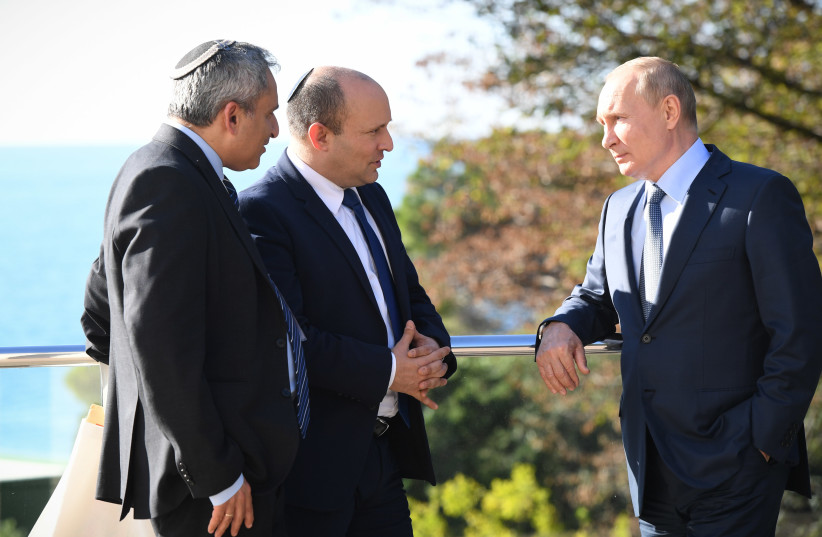When Prime Minister Naftali Bennett flew to Sochi on Friday to meet Russian President Vladimir Putin, there was a special message on the agenda. Apart from the urgent issues the two leaders needed to deal with, it was clear that it was important for both to show that it was business as usual in Israel’s post-Netanyahu political reality.
It’s no secret that Benjamin Netanyahu and Putin enjoyed a generally warm relationship. Despite some ups and downs, there was undoubtedly a certain connection between the two. At times Putin was even accused by Netanyahu’s political rivals of acting specifically to help keep Netanyahu in power: For example, ahead of the April 2019 election, Russia facilitated the return of the body of MIA Zachary Baumel, an IDF soldier who fell in the First Lebanon War and had been buried in Syria. And in January 2020, Putin personally supervised the release of backpacker Naama Issachar, who had been sentenced to 7.5 years in prison after some 10 grams of marijuana were found in her luggage during a layover in a Moscow airport. Issachar returned from Russia on Netanyahu’s flight a few weeks before the March election.
Before leaving on his trip on Friday, Bennett released a statement saying “The ties between Russia and Israel are a significant element in the foreign policy of the State of Israel due to both the special status of Russia in the region and its international role, and to the million Russian-speakers in Israel, who constitute a bridge between the two countries.”
The fact that the meeting between Putin and Bennett lasted five hours, meaning that Bennett had to extend his stay in Russia to include Shabbat, has been highlighted as demonstrating that the visit went well. The photo of the two leaders looking relaxed against the backdrop of the Black Sea at the Russian resort town also served to emphasize the cordiality of the meeting. For Putin, it was important to show that he could be as generous a host over Shabbat as US President Joe Biden was when Bennett’s stay in Washington was extended over Shabbat in August.
According to TASS, Russia’s news agency, at the start of the meeting, Putin told Bennett: “We have many issues that we can and should discuss. Despite the internal political battles which are inevitable for every country, I really hope that your government will still pursue a policy of continuity in terms of Russian-Israeli relations.”

It is significant that Bennett and Putin agreed to continue the deconfliction mechanism between the air forces of the two countries when it comes to Israeli strikes in Syria, where Russia maintains a military presence. Israel attacks Iranian targets in Syria in order to stop Iran and its proxies from establishing bases on Israel’s northern border or transferring weapons to Hezbollah, but Jerusalem takes every effort to avoid accidentally harming Russian forces during these operations.
Since Russia is a member of the P5+1 group of countries that negotiated the Joint Comprehensive Plan of Action, the Bennett-Putin meeting also addressed Iran’s nuclear program.
Bennett and Putin agreed to expedite work on a trade deal between the countries, and find a way to allow Russian tourists back into Israel even though the FDA has not yet approved Russia’s Sputnik-V anti-COVID vaccine.
Referring to Israelis who immigrated from the Former Soviet Union, Bennett noted that “Israel has a million ambassadors, a million Russian-speaking Israelis, who are a great contribution to Israel’s culture, as well as the mentality they bring here of hard work, power, strength.”
Putin said that Israel may have the largest concentration of Russian-speakers outside the Former Soviet Union.
Bennett said his meeting with Putin is “based on the deep connection between the two nations. We see you as a real friend of the Jewish people.”
This year, Israel and Russia are marking 30 years of diplomatic relations after ties were restored following the fall of the Iron Curtain. These diplomatic relations are definitely worth celebrating. Differences of opinions and interests can be expected and are only natural but it is essential that relations between the two countries go beyond the personal. That seems to have happened in Sochi on Friday.
